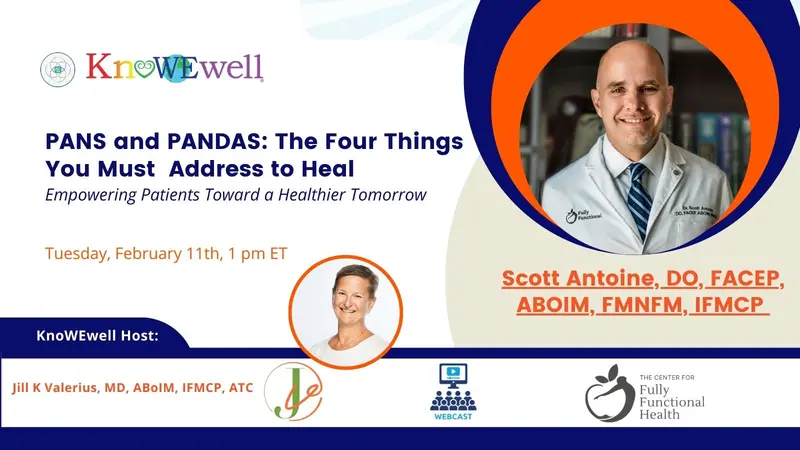
Pans and Pandas: The Four Things You Must Address to Heal: Empowering Patients Toward a Healthier Tomorrow
In this presentation, Scott Antoine, DO, FACEP, ABOIM, FMNFM, IFMCP provides an overview of Pans and Pandas.
In the early 1990s, a group of researchers at the National Institute of Mental Health began collecting data on children who had developed neuropsychiatric disorders (OCD and tics) following infections. They found evidence in some of these children that antineuronal antibodies were attacking a specific region of the brain, and MRI and PET scans showed inflammatory changes in the same area.
In 1997, these researchers published the first article about a syndrome they named PANDAS (Pediatric Autoimmune Neuropsychiatric Disorder Associated with Strep infections).
PANS/PANDAS are inflammatory conditions where the patient’s immune system attacks the basal ganglia. The basal ganglia is an area of the brain that helps regulate voluntary movement, learning, emotions, and routine behaviors or habits. As a result, the inflammation associated with PANS/PANDAS typically leads to sudden onset OCD and other mental health symptoms, causing drastic changes in attitudes and abilities almost overnight.
Previously energetic and outgoing children may become terrified, angry, and withdrawn, unable to connect with others or understand schoolwork. Adults who develop symptoms may suddenly feel overwhelmed and enraged, frightened of the world around them and driven to change their habits without understanding why.
PANS/PANDAS typically affects children between 3 years old and puberty, and boys are twice as likely as girls to develop PANDAS. However, PANS or PANDAS may start after the teen years, in which case the disorder is referred to as autoimmune encephalitis.
Facing PANS/PANDAS can be a terrifying, isolating experience for both the patient and their community. PANS/PANDAS also offer a particular challenge to physicians attempting to diagnose and treat these complex disorders.
Learning Objectives:
- Understand the pathophysiology behind molecular mimicry and its role in autoimmunity
- Be well informed about the neuropsychiatric symptoms from Strep (and other pathogens and toxins) and how they lead to autoimmune CNS responses
- Understand the history of PANS and the outcomes we have seen in the academic and community centers treating children with this disorder
- Have a good understanding of the appropriate diagnostic work-up for these children and current effective treatment approaches
KnoWEwell.com
KnoWEwell operates the private and secure Regenerative Whole Health® Hub – the all-in-one, global, trusted online health and well-being solution – bridging the knowledge, access, and insurance gaps. Centralizing knowledge, education, and evidence-based resources. Connecting the ecosystem to collaboratively help individuals prevent harm, address the root causes of disease, and achieve WELLthier Living®!
Did you know you can curate your own learning library?
Among our plethora of membership benefits, you can create your own library! With a KnoWEwell membership, you get access to KnoWEwell’s Education Center with educational programs from today’s top thought leaders and experts. Learn how to prevent and address the root causes of chronic disease. Keep track of the programs you have already viewed and watch them anytime you or your family need help.
Join today, get started on your journey to achieve WELLthier Living® – Happy. Healthy. Abundant. Purpose-filled!


